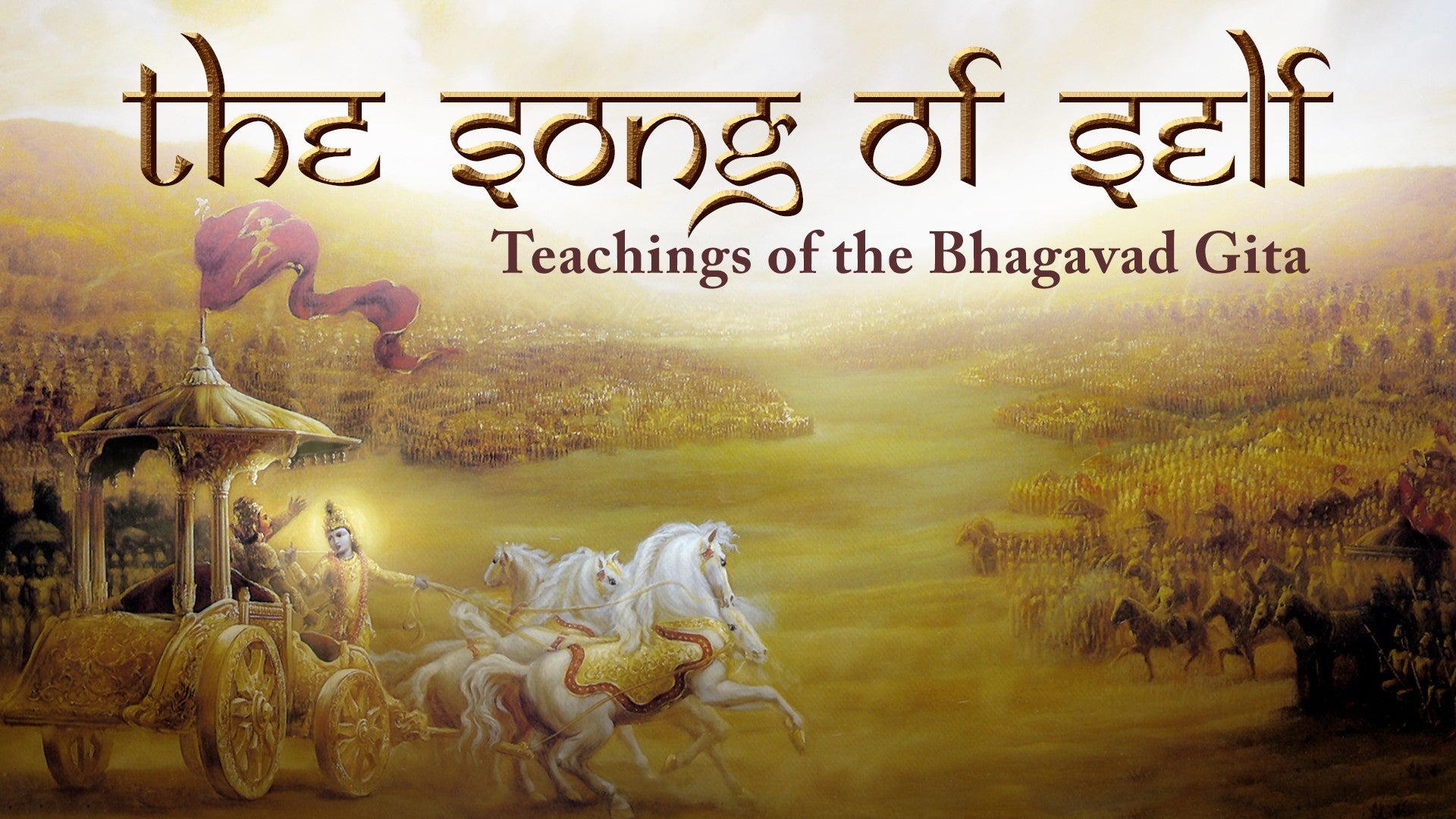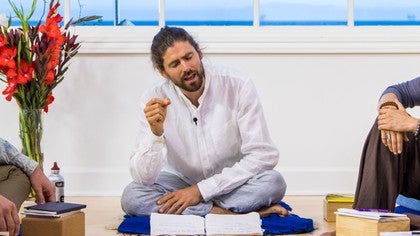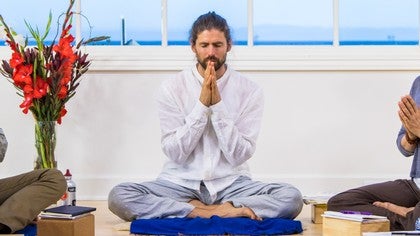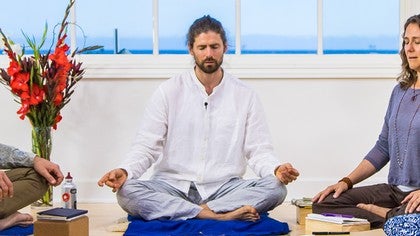Description
About This Video
Transcript
Read Full Transcript
So now we come to the 72nd verse, which is the final verse of the 2nd chapter. The chapter which we mentioned at the beginning is really the distillation of the whole of the teaching of the Gita and some consider of the whole of the Upanishadic wisdom. So let's see how Krishna wraps things up in this section which has come to be referred to as the 2nd chapter on Sankhayoga which gives the whole underpinnings of the yoga system. He says, Esha brahmani sthith pata nainam prapya vaymuhyati sthith vasyamantakalipi brahmanirvanamrichati So in the previous verse, Krishna said, you can really come to peacefulness. He was taught about in 1771 how, through cultivating particular ways of being, you can come to oneness, you can come to fullness, you can know real peace. Here he says, Esha brahmani sthith pata. So he addresses him as partha, son of pritha, you who are a human being. Esha brahmani sthithi, once you have stood in this state that he calls brahmani, which is, in other words, a state, brahman means totality. So he personifies it in the feminine, shaktified form. So when you have the real life, powerful experience of standing established in this state of true integration, of vital peacefulness, then inam prapya nathimuhyati, having obtained an experience, this you will no longer be confused. So the idea, sometimes people have the question, oh, am I enlightened? Well, if you have the question, then maybe not. The idea is, if you get to have this experience, all your confusion is obliterated because this is the experience of oneness. This is the experience where duality and doubts dissolve. This is not something I can speak about from direct experience. This is just what I've been given to understand from working with the teachings. But Krishna is laying it down. When you stand, when you, like, esha brahmani sthithi, so you're establishing it, you're experiencing it, it's part of you, when you experience that, having experienced that, then confusion dissolves, it falls away. Sthithva asyam antakale api brahmani rvanam richati. So Krishna says, sthithva, having stood, having experienced asyam in this, having stood in this, having experienced this, antakale api, even at the end, even at the last moment, then richati, you attain to brahmani rvana, the nirvana of totality. So if you experience this state of fullness, even in your dying breath, then you can go to liberation. But we'll talk a little more about what does brahmani rvana mean. So brahman, one way we can take is its totality. Nirvana is a word that has also, one of these Sanskrit words that has come into English. And I imagine that many people who are watching this may also be familiar with the name nirvana because of a particular rock band. And I remember when the nirvana rock band were popular, people would say, nirvana means annihilation. This is one sense of nirvana. But nirvana literally means, nir means without, and vana is related to vata, which means wind or air. So without air. Now there's a very beautiful definition of nirvana. Let me see if I can remember it correctly. It says, nirvana is a place where the winds of desire no longer blow. I think I read that in a John O'Donoghue book, but he said it was a Buddhist friend of his who said it. But nirvana in the yogic sense gets expanded beautifully by Krishna. I think it's in the sixth chapter, might be the fifth of the Gita. And Krishna says, he's describing the mind of the yogin as like a room. Excuse me, he's describes the mind of the, that's not a good way of saying it. He describes the awareness of the yogin as like a candle in a room which is nirvana, which is without wind. So at the end of the chapter, I think it's only too fitting that we give a final outing to my beloved bottle. And here it is. Let's imagine that this is the candle and this is the flame in the center of a room. Now if there is wind in the room and it's dark and this is the only light in the room, it's not a strong wind, the candle is staying alight. What will happen to our view of the room? The light is flickering, so our view will only be partial. But if the wind subsides and it becomes still and we have a steady flame, what will happen to our vision, our view, our perception of the room? Then it will become much fuller. It will become clearer, let's say. However, will it really be full? Let us imagine that there is another item and for this I will have to dive deep into my pocket, but I do think I have one more thing in my pocket, yes. I have my little watch. Use this here. So if there's an item or some object in the room, what will we have here? If this is the light, then this will be shade. So even if the candle flame is still and we're getting a pretty good view of the room, some places will be in shade, some places will be in shadow. If, however, truly the room is in a near of honor state, if there's no air at all in the room, what will happen to the candle flame? It will be annihilated. It will be extinguished. And then how will we see the room? We will see it in this state which sometimes people refer to as the void. We will see it devoid of light, dark, good, bad, yes, no. We will see it as it is. And this is the state of near of honor. You're completely free of your conditioning. So it's the idea that if you stand in that deep peacefulness of your essence, if you really fully experience even for a moment, all your confusion will melt away. And even if that is at the end, once you've experienced it, then you will actually experience this Brahmani Ravana, this complete vision which will allow you to see beyond the conditionings that tell you, yes, no, good, bad, light, dark, you'll be able to see things as they really are. And so it's the idea that as we practice, we can expand or clarify our capacity to see.
And if we keep doing it, we can deepen that sense of peacefulness. And maybe even if we don't get to that full state, step by step, we can start to experience more of this. Now, this is being filmed in the United States. So I think it's only really appropriate to add a little bit of contemporary, well, not really contemporary anymore, but a little bit of Western flavor to the ending. And I'd like to mention my very favorite near of honor song. Now, I have to confess, when I was a boy, I wasn't a huge near of honor fan, but I was exposed to their music and I did enjoy some of their songs. And my very favorite, the first few lines, I see them as being so full of yoga. And one song, it begins. Come as you are, as you were, as I want you to be, as a friend. And that's it. Just come as you are, as you were, as you've always really been, as your own true friend. So if we can find the courage to bring ourselves fully, wholly into the here and now, every part of ourselves without leaving anything out, come to that true yukta state where we're connecting all parts of ourselves to the center, then maybe even here now in the middle of the whirling wonder of life, we can truly be our own friend and give ourselves permission to actually experience and relish the fullness that we really are. And for me, that's what yoga is about. It's about coming home to ourselves, accepting ourselves as we are, working with the reality of our real life situation steadily, patiently, to allow ourselves to be more and more who we really are.
The Song of Self: Bhagavad Gita: Chapter 2
Comments
You need to be a subscriber to post a comment.
Please Log In or Create an Account to start your free trial.









